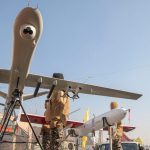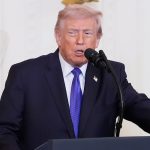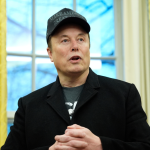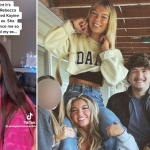President Donald Trump has said he deserves a Nobel Peace Prize, which eluded him during his first administration, but he’ll find out on Friday if he finally got selected for the prestigious award.
Trump would be only the fifth U.S. president to win a Nobel Peace Prize, following in the footsteps of former Presidents Barack Obama, Jimmy Carter, Woodrow Wilson, and Teddy Roosevelt.
The 2025 winner will be announced this Friday at 5 a.m. and presented with the award on Dec. 10 during a ceremony in Oslo, Norway.
The president frequently mentions the Nobel Prize and his belief that he’s earned one for his part in “ending seven unendable conflicts,” though he has had different levels of involvement in a handful of those conflicts, some of which have yet to be completely resolved.
He’s also said he doesn’t believe he’ll get it even though he believes he deserves it.
“Nobody’s ever done that,” he told a gathering of military leaders at Marine Corps Base Quantico in Virginia earlier this month. “Will you get the Nobel Prize? Absolutely not. They’ll give it to some guy that didn’t do a damn thing.”
He listed the seven conflicts he claimed to resolve during an address in front of the United Nations General Assembly. They are Armenia and Azerbaijan; Israel and Iran; India and Pakistan; Cambodia and Thailand; the Democratic Republic of Congo and Rwanda; Egypt and Ethiopia; and Kosovo and Serbia. On Wednesday, he may have got another one in under the buzzer, as he announced Israel and Hamas had agreed to the terms of the first stage of a peace deal, two years after the Oct. 7, 2023 terrorist attacks.
Leaders from various countries have expressed their support for Trump to be given the award, though some of those endorsements came after the deadline.
Armenia and Azerbaijan:
Trump hosted Azerbaijani President Ilham Aliyev and Armenian Prime Minister Nikol Pashinyan at the White House in August to resolve their decades-old conflict.
The two former Soviet countries have been in conflict for decades, and the Trump administration’s plan outlined increased economic cooperation, both with each other and with the West, as the means to end the dispute.
With the agreement, Armenia will give the United States a 99-year lease on the Trump Route for International Peace and Prosperity, or TRIPP, which includes the Zangezur Corridor, located between mainland Azerbaijan and the Nakhchivan exclave, according to Politico.
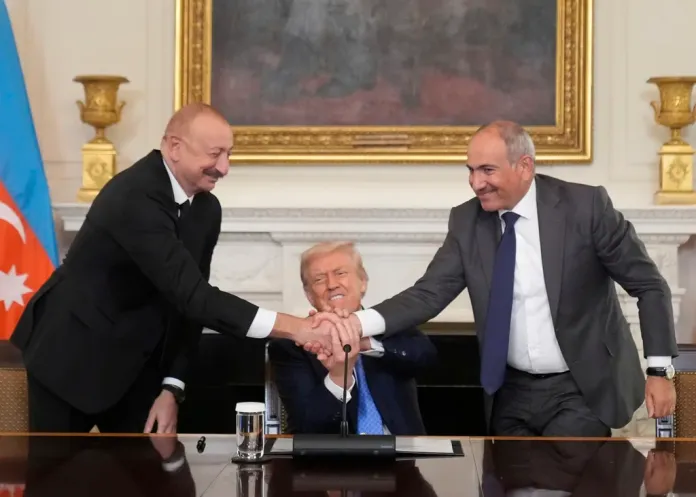
“I’m of a certain persuasion, no matter what I do, they won’t give it, and I’m not politicking for it,” Trump said of the prize committee. “But it would be a great honor, certainly, but I would never politic … number one, I want to save lives. That’s why I’m involved so much with Ukraine and Russia, saving lives of Russians and Ukrainians. It’s not American lives.”
Both Aliyev and Pashinyan said they would support Trump’s bid for a Nobel.
World leaders have nonetheless joked about Trump mixing up Armenia and Albania when touting his role in the peace process.
At a recent European Political Community meeting in Copenhagen, Albanian Prime Minister Edi Rama joked about the matter to French President Emmanuel Macron in a moment that was caught on camera.
“You should make an apology … to us because you didn’t congratulate us on the peace deal that President Trump made between Albania and Azerbaijan,” a smiling Rama told Macron.
Israel and Iran:
Trump abruptly announced a ceasefire agreement made between Israel and Iran to end their nearly two-week war.
Both Israel and Iran ultimately wrapped up operations shortly after Trump’s announcement, but there’s been no firm, long-term peace established. Iran is allegedly trying to rebuild its missile production sites, which were targeted, while Israel is still at war in other areas.
The direct confrontation was the first time the two nemeses engaged in direct military conflict. The two sides had historically engaged in acts of sabotage, espionage, and assassinations, but not direct military engagement.
Israel launched the opening salvo against Iran’s nuclear program, including on nuclear scientists, military leaders, and facilities. The U.S. military carried out one operation targeting three Iranian nuclear facilities during the war.
India and Pakistan:
India and Pakistan, two purported nuclear powers and longtime enemies, engaged in their most intense conflict in decades this spring.
India fired missiles at nine sites in Pakistan in response to a massacre that killed more than two dozen Hindu tourists in Indian-administered Kashmir, which Indian officials blamed on Pakistan. Trump announced a ceasefire between the two countries on May 10, and while both sides accused the other of violating it, the agreement has held up.
Indian officials have acknowledged the U.S. played a role in reducing the tension, but said they negotiated directly with Pakistan, while Pakistani leaders have thanked Trump for helping and nominated him for a Nobel Peace Prize.
Cambodia and Thailand:
Cambodia and Thailand engaged in fighting for several days this summer. More than 40 people were killed, and about 300,000 people were displaced.
Trump told the leaders of both countries that he would stop trade talks with them unless they agreed to a ceasefire. Two days later, representatives met in Malaysia and reached a deal to stop the budding conflict.
Cambodian Prime Minister Hun Manet said he nominated Trump for a Nobel Prize.
The two Southeast Asian neighbors share a border that extends for more than 500 miles, and there have been flare-ups of violence for decades.
The president’s agreement did not resolve their outstanding problem, however, which is who can rightfully claim the centuries-old Hindu temples along the border that date back to the ancient Khmer Empire.
Democratic Republic of Congo and Rwanda:
Senior leaders from the Democratic Republic of Congo and Rwanda traveled to Washington, D.C. in June to sign a peace agreement to end their conflict, which has spanned more than three decades.
There was optimism at the June 27th Oval Office ceremony with Trump, Rwandan Foreign Minister Olivier Nduhungirehe, and Congolese Foreign Minister Therese Kayikwamba Wagner, after signing a deal to end fighting between Kinshasa and the Rwandan-backed insurgency in the eastern DRC, led by the rebel group M23.
But the talks on a more comprehensive agreement have broken down, and fighting has restarted.
Egypt and Ethiopia:
The two African nations are not in a direct military conflict but are in a bitter dispute over a large hydroelectric dam that Ethiopia opened last month, and there are concerns the situation could deteriorate.
The Grand Ethiopian Renaissance Dam on the Blue Nile, a tributary of the Nile River, took about 15 years to build. Officials see it as a key factor in their hopeful economic prosperity, while Egypt and Sudan have long opposed it, over concerns of how it’ll impact the countries.
“We worked on Egypt with their next-door neighbor, who it’s a good neighbor. They’re friends of mine, but they happened to build a dam which closed up water going into a thing called the Nile. I think if I’m Egypt, I want to have water in the Nile, and we’re working on that one. It’s a problem, but it’s going to get solved,” Trump said in July.
Kosovo and Serbia:
Trump said he resolved the conflict between Kosovo and Serbia, which is likely a reference to the agreement both countries signed to pursue economic ties in 2020 during his first term. No peace deal has been signed.
Kosovo declared its independence from Serbia in 2008, nine years after NATO began its bombing campaign against Serbian forces responsible for a crackdown on ethnic Albanians in Kosovo.
The U.S. has recognized Kosovo’s independence, as have many European countries, but Serbia still refuses to do so, as do its allies Russia and China.
Israel and Hamas
On Wednesday, Trump announced that Israel and Hamas had agreed to the first stage of what is hoped to be a peace deal. The deal allows the release of the 48 remaining Israeli hostages, both dead and alive. While this announcement is undoubtedly positive, it remains to be seen if both sides are able to adhere to the 20-point plan drawn up by Trump and his team.
Independent of the announcement of the deal, the Hostage Family Forum, an organization representing families of the remaining 48 Israeli hostages held by Hamas, urged the Norwegian Nobel Committee to award Trump the Nobel Peace Prize.
Ukraine Russia conflict remains at an impasse
Nearly two months after meeting Russian leader Vladimir Putin in Anchorage, Alaska, in mid-August, little has changed. Russian forces are continuing to carry out attacks far from the front lines, targeting Ukrainian civilians as the front lines remain largely unchanged.
Deputy Foreign Minister Sergei Ryabkov said on Wednesday that the “momentum” created by the Trump-Putin summit “has been largely exhausted by the efforts of opponents and supporters of the war.”
Trump notably repeatedly said on the 2024 campaign trail he could end the war in one day. Trump has since said he was exaggerating and such comments were made “in jest”.
Other US presidents:
Former President Barack Obama is the last U.S. president to win the Nobel Peace Prize. He did so in 2009, less than a year into his first term. Critics said at the time he hadn’t yet earned it.
Obama said he did not “view it as a recognition of my own accomplishments but rather an affirmation of American leadership on behalf of aspirations held by people in all nations.”
Carter was given the award in 2002 for his “Decades of untiring effort to find peaceful solutions to international conflicts.” Wilson won it in 1919 for leading the creation of the League of Nations following World War I, and Roosevelt won it in 1906 for mediating an end to the Russo-Japanese War.

